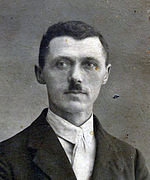Johann Geusendam, Date of Birth, Place of Birth, Date of Death
TweetJohann Geusendam
 Date of Birth: 24-Feb-1866
Date of Birth: 24-Feb-1866
 Place of Birth: Netherlands, Kingdom of the Netherlands
Place of Birth: Netherlands, Kingdom of the Netherlands
Date of Death: 06-Apr-1945
Profession: politician, resistance fighter
Nationality: Kingdom of the Netherlands
Zodiac Sign: Pisces 
About Johann Geusendam
- Johann Geusendam (24 February 1886 - 6 April 1945) was a Dutchman who moved with his fiancée to Bremen in 1905 in order to improve his job prospects.
- Bremen was a geographically small but industrially, commercially and economically dynamic "autonomous component state" which had become part of Germany in 1871.Geusendam was politically engaged and became increasingly active.
- This came to the attention of the authorities.
- In 1908, after taking part in a strike, still aged only 22, he was identified as a "troublesome foreigner" ("lästiger Ausländer") and deported from Bremen.
- Till 1933 Germany resisted pressure to copy the Anglo-French model of an ever more centrally controlled state, and Geusendam's expulsion became the focus of a thirty year foreign policy debate in the Bremen Bürgerschaft (parliament) as to whether or not depriving a man of citizens' rights fell within the competence of the city authorities and their senate.One reason that Geusendam was the focus of the debate for so long is that after his expulsion he soon returned, illegally, to Bremen for family reasons, and the authorities grudgingly suspended his expulsion.
- He was expelled again in 1921 but managed, with the support of the labour movement, to remain in Bremen till 1931, when he really was expelled.
- The family relocated briefly to the Soviet Union.
- Later he fell foul of the Hitler government as a result of his political activities in the border region between the Netherlands and Germany.
- He was arrested in 1940 and held in government detention at a succession of institutions till, through physical mistreatment and malnutrition, he died in April 1945.
Read more at Wikipedia
See Also
- Famous People's Birthdays on 24 February, Kingdom of the Netherlands
- Famous People's Birthdays in February, Kingdom of the Netherlands
- Famous politician's Birthdays on 24 February, Kingdom of the Netherlands
- Famous politician's Birthdays in February, Kingdom of the Netherlands
- Famous resistance fighter's Birthdays on 24 February, Kingdom of the Netherlands
- Famous resistance fighter's Birthdays in February, Kingdom of the Netherlands

